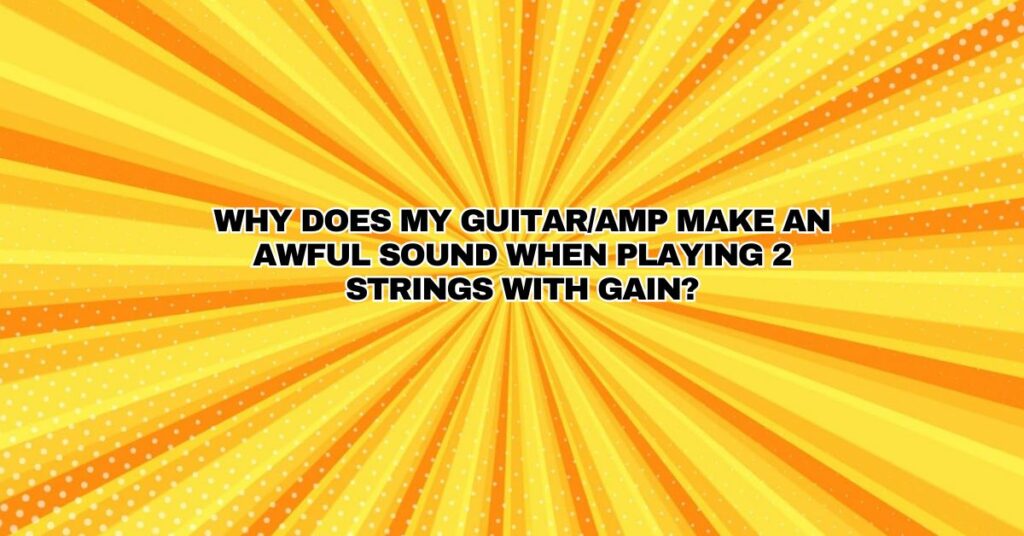Experiencing an awful sound when playing two strings with gain on your guitar and amp is a common issue faced by many guitarists. This unwanted noise can be both frustrating and detrimental to your playing experience, but understanding the causes of this problem and how to resolve it is essential. In this article, we’ll explore the potential reasons behind the awful sound when playing two strings with gain and provide guidance on how to identify and address these issues.
1. Intentional Sound Layering:
Before diving into troubleshooting, it’s important to recognize that playing two strings with high gain can produce unique harmonics and overtones. Some guitarists intentionally use this effect to create a “wall of sound” or add depth to their music. However, if this isn’t the desired effect and you’re experiencing an “awful” sound, it’s likely due to other factors.
2. Phase Cancellation:
When two or more strings are played simultaneously, phase cancellation can occur, leading to a loss of clarity and the production of undesirable sounds. This is more noticeable with high-gain settings because the amplifier amplifies the cancellation, resulting in an unpleasant tone.
Solution: To mitigate phase cancellation issues:
- Adjust the pickup height on your guitar. Altering the distance between the strings and the pickups can affect the phase relationships and improve clarity.
- Experiment with the pickup selector switch. Different pickup combinations can produce varied phase relationships and may sound better when playing two strings with gain.
- Use single-coil pickups. Single-coil pickups are less prone to phase cancellation than humbuckers, which can help in reducing the problem.
3. Faulty or Poor-Quality Cables:
The use of damaged or low-quality cables in your signal chain can lead to interference, noise, and an awful sound when playing two strings.
Solution: To address cable-related issues:
- Inspect your instrument cable for visible damage, frayed ends, or loose connectors. Replace any damaged cables with high-quality, shielded ones.
- Consider using shorter cables, as longer cables are more susceptible to interference and signal degradation.
4. Grounding and Interference:
Issues related to grounding and electromagnetic interference (EMI) can introduce noise and affect the sound when playing multiple strings with gain.
Solution: To mitigate grounding and interference issues:
- Ensure that your guitar and amplifier are properly grounded. Faulty or ungrounded equipment can contribute to noise problems.
- Position your gear away from electronic devices and potential sources of EMI, such as fluorescent lights, Wi-Fi routers, or smartphones.
- Use a power conditioner or surge protector to filter out electrical noise and provide clean and stable power to your equipment.
5. Pickup Configuration:
Different pickup configurations, such as single-coil or humbucking pickups, can react differently to high-gain settings. The pickup type can influence the noise and tone produced when playing two strings simultaneously.
Solution: To address pickup-related issues:
- Experiment with pickup combinations on your guitar. You may find that certain combinations produce a more pleasing sound when playing with high gain.
- If you’re using a guitar with humbuckers, try using single-coil mode if available, which can reduce noise and improve clarity.
6. Feedback and Acoustic Resonance:
The interaction between your guitar and amplifier can sometimes lead to feedback and unwanted resonances, especially at high-gain settings.
Solution: To mitigate feedback and resonance issues:
- Experiment with amplifier settings, such as gain, EQ, and presence controls, to find a balance that minimizes feedback while preserving your desired tone.
- Reduce the proximity of your guitar to the amplifier, as physically moving the guitar closer to the amp can create feedback.
- Use feedback suppressors or noise gates in your signal chain to manage unwanted noise, especially when using high gain.
7. Professional Inspection:
If you’ve gone through the above steps and the issue persists, or if you’re uncertain about diagnosing and resolving the problem, consulting a professional guitar technician or amplifier expert is advisable. They can perform a thorough inspection of your gear, identify the cause of the awful sound, and make the necessary adjustments or repairs.
In conclusion, an awful sound when playing two strings with gain on your guitar and amp is a common issue that can result from various factors, including phase cancellation, cable quality, grounding, pickup configuration, feedback, and acoustic resonance. By methodically troubleshooting and addressing each potential cause, you can often identify and resolve the issue, allowing you to play with the desired tone and clarity. Remember that it’s essential to understand your gear and experiment with different settings to achieve the best results for your playing style and musical preferences.


